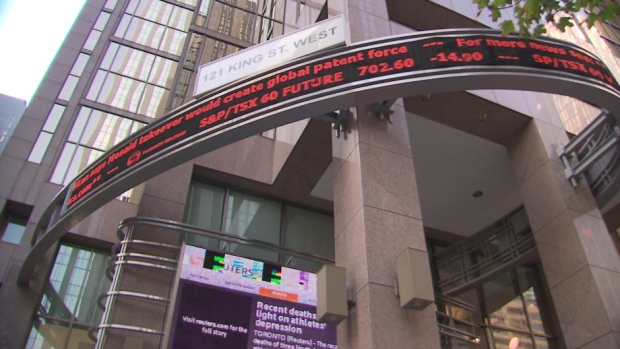Apr 12, 2017
TSX closes lower on energy losses; BlackBerry jumps to one-year high
, Reuters

Canada's main stock index fell on Wednesday, as losses for its heavyweight financial and natural resource sectors offset a sharp boost in BlackBerry Ltd shares after it won an arbitration ruling against chipmaker Qualcomm Inc.
Lower oil prices pulled the index's influential energy group down 1.1 per cent overall, while the financials group fell 0.8 per cent, as investors took a cautious approach to lingering geopolitical tensions ahead of corporate earnings season.
Major oil sands player Canadian Natural Resources Ltd (CNQ.TO) fell 1.2 per cent at $44.72.
"Earnings season is coming up fast and furious and we'll get a good idea of what companies are predicting for the rest of the year," said Barry Schwartz, portfolio manager at Baskin Financial Services.
"Corporations aren't putting money to work because they're not seeing demand like they were seeing, and of course we're very resource-heavy and prices don't dictate for anyone to start a new oil sands project here."
Cenovus Energy Inc declined 1.8 per cent to $14.45. The company's chief executive said on Tuesday that Cenovus will do more hedging after its acquisition of ConocoPhillips (COP.N) assets as he mounted a charm offensive on investors who balked at the deal.
Royal Bank of Canada (RY.TO), the country's largest lender, fell 0.8 per cent to $96.06 and Toronto-Dominion Bank (TD.TO) lost 0.9 per cent to $65.57.
Bombardier Inc (BBDb.TO) fell 6.3 per cent to $2.22 after a sharp gain in the prior session on reports its rail division is in merger talks with Siemens AG.
The Toronto Stock Exchange's S&P/TSX composite index settled down 78.71 points, or 0.50 per cent, at 15,648.40, with half its 10 main groups in negative territory.
Decliners outnumbered advancers by 1.5-to-1.
BlackBerry (BB.TO) surged 15.4 per cent to $11.85, hitting its highest level since January 2016, after Qualcomm was ordered to repay it US$814.9 million in royalty payments.
Shaw Communications Inc (SJRb.TO) also gained, up 4.8 per cent at $28.77 after reporting a jump in revenue driven by the addition of more wireless customers.
The Bank of Canada said it did not consider cutting interest rates as it left monetary policy unchanged amid signs of strong growth, but it is too early to conclude the economic growth is sustainable, Governor Stephen Poloz said on Wednesday.
Gold prices steadied after hitting a five-month peak in the prior session and copper fell.
The materials group, which includes precious and base metals miners and fertilizer companies, lost 0.4 per cent.
U.S. MARKETS
U.S. stocks eased on Wednesday and the S&P 500 closed below a key technical level for the first time since Election Day, pressured by lingering geopolitical concerns and President Donald Trump's comments on the dollar and interest rates.
Trump said in a Wall Street Journal interview that the dollar "was getting too strong," though he also said he would like to see interest rates stay low.
The dollar, which has risen along with prospects for higher rates, hurts profits at U.S. multinationals when it strengthens.
"Markets don't like uncertainty," said Peter Tuz, president of Chase Investment Counsel in Charlottesville, Virginia.
"This just kind of added another wild card into the mix in a way, whether there will be actions taken to keep the dollar from strengthening further."
Investors sought shelter in defensive shares and other low-risk assets. Industrials and materials were the biggest drags on the market along with financials, while utilities, staples and telecommunications gave the S&P 500 its biggest lift.
The S&P financial index was down 0.9 per cent a day ahead of results from three major banks in what will mark the start of the corporate earnings season. Analysts are expecting earnings to have risen 10 per cent for all S&P 500 companies in the first quarter, Thomson Reuters data shows.
The materials and industrials indexes both ended more than one per cent lower on the day.
In a sign that further weakness may be ahead, the S&P 500 closed below its 50-day moving average for the first time since Nov. 8. The CBOE Volatility index, Wall Street's fear gauge, extended recent gains, a day after it closed above 15 for the first time since the election.
Rising U.S. tensions with Russia, North Korea and Syria after U.S missile strikes in Syria last week and the moving of U.S. warships toward the Korean Peninsula have kept investors cautious.
The Dow Jones Industrial Average closed down 59.44 points, or 0.29 per cent, to 20,591.86, the S&P 500 lost 8.85 points, or 0.38 per cent, to 2,344.93 and the Nasdaq Composite dropped 30.61 points, or 0.52 per cent, to 5,836.16.
Investors are concerned these developments could distract Trump from pursuing pro-business policies such as tax cuts, simpler regulations and higher infrastructure spending, promises that have powered Wall Street to record highs since his election in November.
Wells Fargo, Citigroup and JPMorgan are due to report results on Thursday, the last trading day of the week ahead of the Good Friday holiday.
Delta Air Lines closed down 0.5 per cent at US$45.05 despite a better-than-expected quarterly profit and an upbeat forecast for current-quarter passenger unit revenue.
Declining issues outnumbered advancing ones on the NYSE by a 2.16-to-1 ratio; on Nasdaq, a 2.23-to-1 ratio favored decliners.
The S&P 500 posted 12 new 52-week highs and one new low; the Nasdaq Composite recorded 51 new highs and 42 new lows.
About 6.2 billion shares changed hands on U.S. exchanges, compared with the 6.6 billion daily average for the past 20 trading days, according to Thomson Reuters data.






